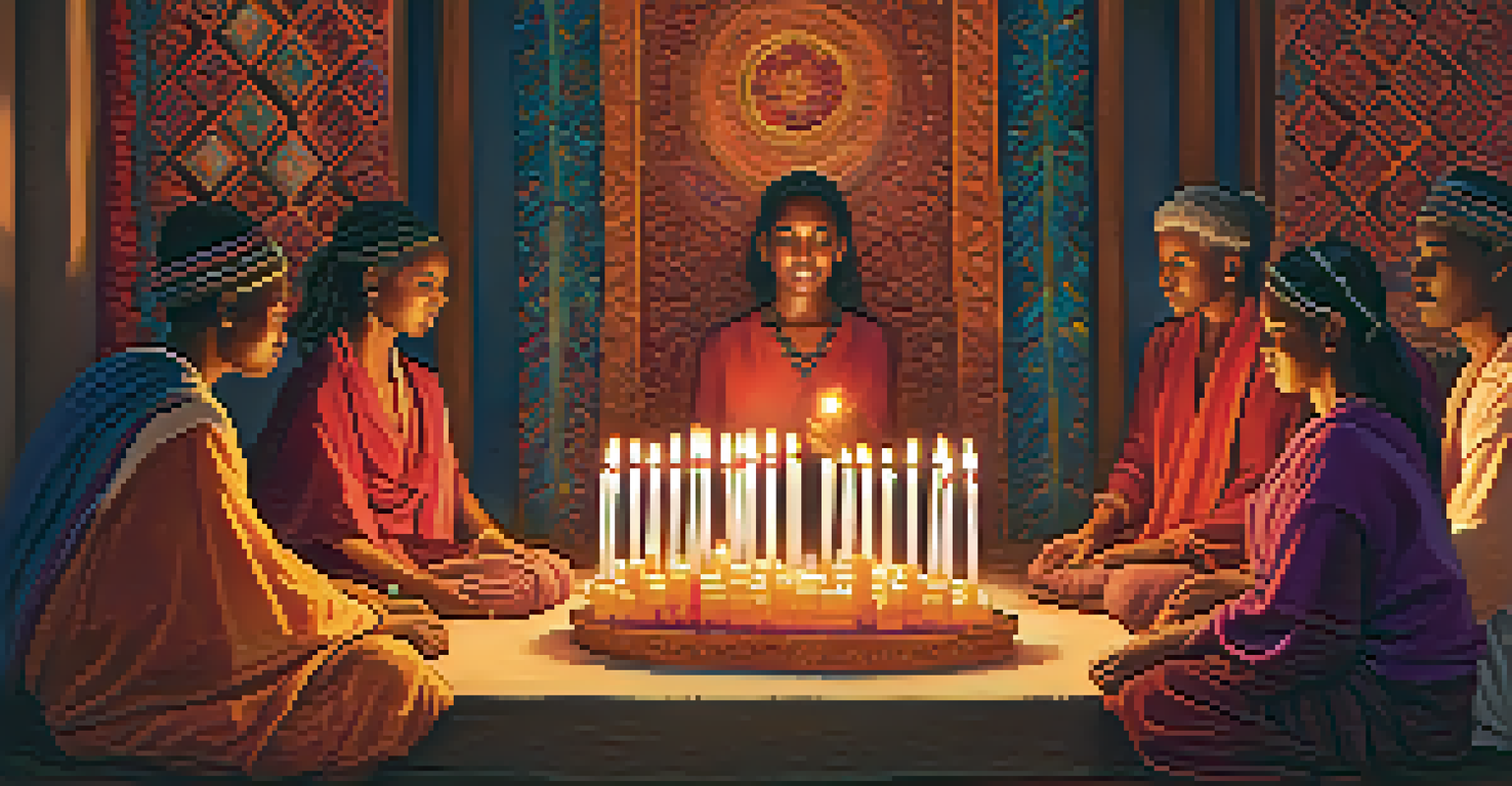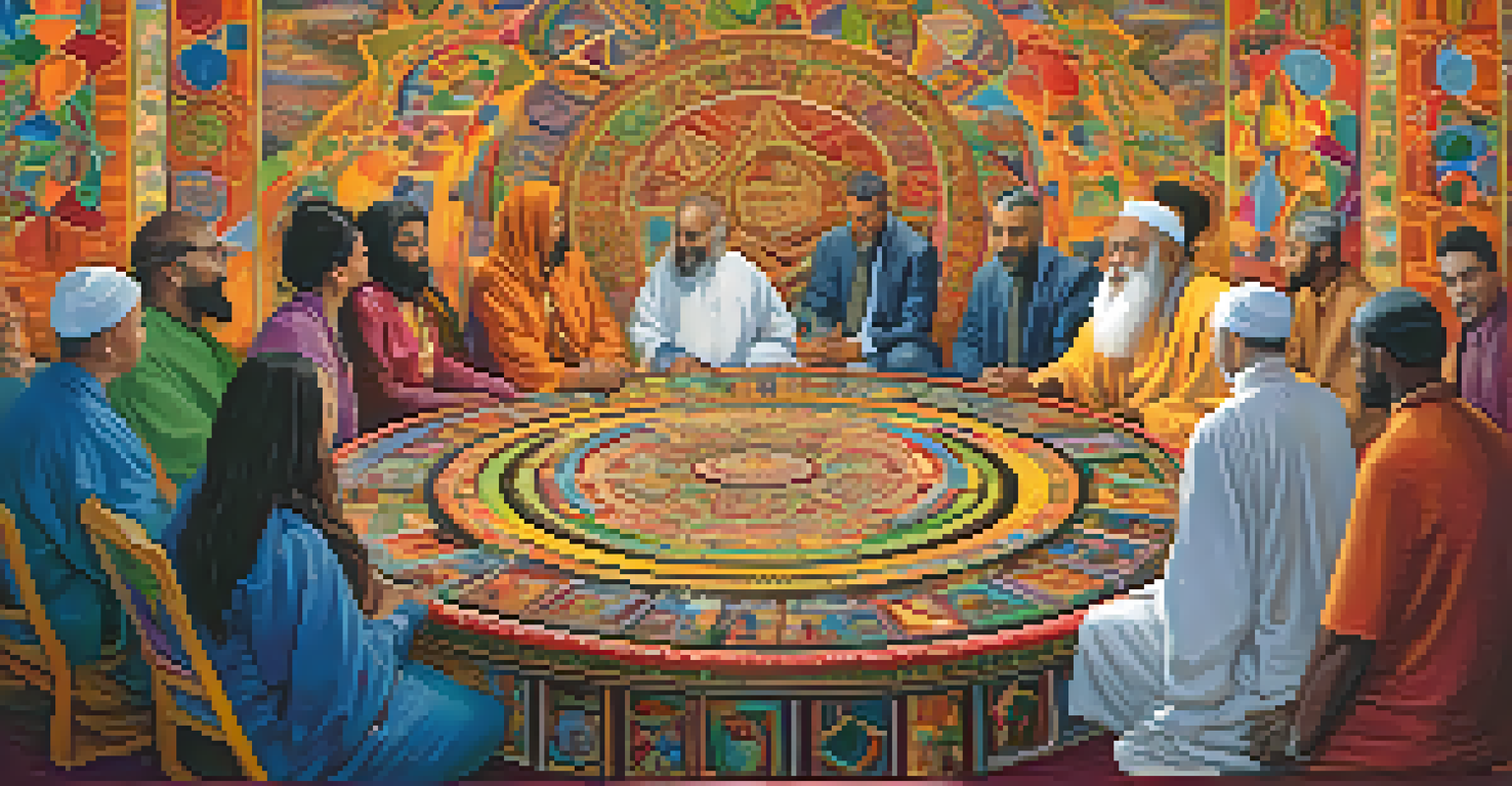How Spiritual Communities Shape Individual Identity and Beliefs

Understanding Spiritual Communities and Their Influence
Spiritual communities are groups where individuals gather to share beliefs and practices centered around spirituality. These communities can range from organized religions to informal gatherings focused on personal growth. They often provide a sense of belonging, which is crucial for individual identity.
The greatest gift of community is a sense of belonging.
When individuals engage with others who share similar beliefs, they often find a supportive environment that encourages exploration and self-discovery. This interaction can lead to the reinforcement of personal values and a deeper understanding of one’s beliefs. As members share their experiences, they contribute to a collective identity that can shape individual perspectives.
Moreover, these communities often provide rituals and traditions that offer structure and meaning to life events. Whether it’s celebrating a holiday or participating in a meditation session, these shared experiences create a bond that further solidifies one’s identity within the group.
The Role of Shared Beliefs in Identity Formation
Shared beliefs are a cornerstone of spiritual communities, acting as a glue that binds members together. When individuals adopt these shared beliefs, they often modify or enhance their personal identity to align with the group. This alignment can create a sense of purpose that may have been previously absent in their lives.

For instance, a person who joins a meditation group may find their understanding of mindfulness deepens, leading to changes in their behavior and outlook on life. As they practice these beliefs consistently, they may begin to see themselves not just as an individual, but as part of a larger collective striving for spiritual growth.
Community Shapes Personal Identity
Spiritual communities foster a sense of belonging and shared beliefs that significantly influence individual identity and personal growth.
This transformation can be both empowering and challenging, as individuals navigate the balance between personal beliefs and community expectations. However, this negotiation often leads to a richer, more nuanced understanding of oneself and one’s place in the world.
Community Support and Its Impact on Personal Growth
One of the most significant benefits of being part of a spiritual community is the support system it provides. Members often encourage each other to grow, heal, and explore new aspects of their spirituality. This nurturing environment can be a catalyst for profound personal change.
Diversity is not about how we differ. Diversity is about embracing one another's uniqueness.
For example, someone facing a personal crisis may find solace in the shared experiences of others in their community. Hearing stories of resilience and transformation can inspire them to embrace their own journey, fostering a sense of empowerment and hope.
Additionally, this support often extends beyond spiritual practices, as members may help each other in times of need, creating a network of care. Such relationships not only strengthen individual identities but also reinforce the values of compassion and empathy within the community.
Exploring Diversity Within Spiritual Communities
Spiritual communities are often diverse, bringing together individuals from various backgrounds, cultures, and belief systems. This diversity enriches the community experience, allowing for a broader perspective on spirituality and personal identity. It encourages members to question their assumptions and explore new ideas.
For instance, a group that includes members from different religious traditions can foster interfaith dialogue. Such exchanges can lead to greater understanding and appreciation of various beliefs, challenging individuals to expand their own identities beyond rigid definitions.
Support Systems Promote Growth
The encouragement and shared experiences within spiritual communities provide vital support that can lead to profound personal transformation.
This exposure to different viewpoints can also lead to a more inclusive understanding of spirituality, where members learn to embrace differences while finding common ground. Ultimately, diversity within spiritual communities helps individuals develop a more holistic sense of self.
Rituals and Their Role in Shaping Identity
Rituals play a vital role in spiritual communities, providing a framework for shared experiences and collective identity. These can range from weekly gatherings to annual celebrations, each designed to reinforce the community's beliefs and values. Engaging in rituals can help individuals feel more connected to their spiritual journey.
For example, a weekly group meditation can create a rhythm that allows members to reflect on their personal growth while feeling part of something larger. These moments of collective focus can deepen one’s commitment to their beliefs and enhance feelings of belonging.
Moreover, rituals often mark significant life events, such as weddings or rites of passage. By participating in these meaningful ceremonies, individuals can connect their personal experiences to the community’s narrative, further shaping their identity within the spiritual framework.
Navigating Conflict and Growth in Communities
While spiritual communities can provide immense support, they are not without conflict. Differences in beliefs or practices can sometimes lead to tension among members. However, navigating these conflicts can also be an opportunity for personal growth and deeper understanding.
When faced with disagreements, individuals may be challenged to articulate their beliefs more clearly and consider perspectives they hadn’t previously entertained. This process can enhance critical thinking and foster emotional resilience as members learn to engage in constructive dialogue.
Diversity Enriches Spiritual Perspectives
Diverse spiritual communities allow members to explore various beliefs, enhancing their understanding of spirituality and personal identity.
Ultimately, how a community handles conflict can significantly impact individual identity. A community that embraces open communication and respects differing viewpoints can help its members develop a more adaptable and inclusive sense of self.
The Lasting Impact of Spiritual Communities on Identity
The influence of spiritual communities on personal identity can extend far beyond the immediate context. Many individuals carry the lessons learned and connections made within their communities into other aspects of their lives. This lasting impact can shape personal relationships, career choices, and even community involvement.
For instance, someone who has experienced transformative growth within a spiritual community may feel compelled to advocate for social justice or volunteer their time. The values instilled during their time in the community can guide their actions and decisions, reflecting a deeply rooted identity.

Moreover, the connections formed within these communities often lead to lifelong friendships and networks. These relationships can provide ongoing support and encouragement, helping individuals navigate life’s challenges while remaining true to their evolving beliefs and identity.